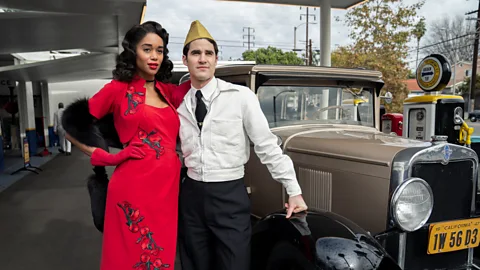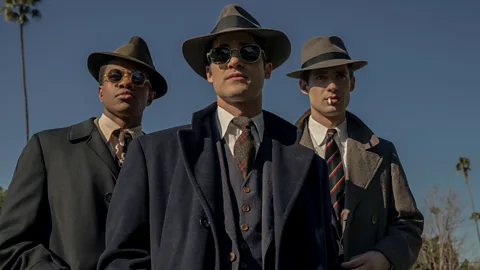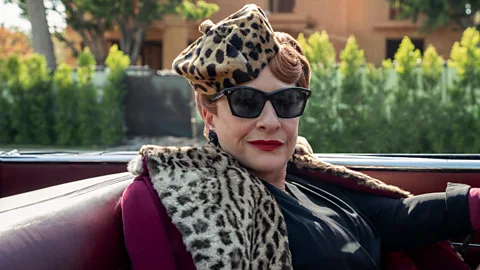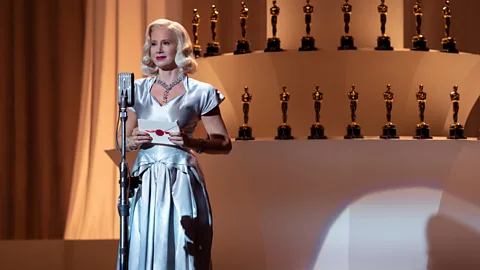Hollywood review: This lavish period fantasy is a disaster
 Netflix
NetflixFor his second Netflix show, Ryan Murphy has imagined an alternate post-war Tinseltown in which minorities thrived. Sadly, as drama, it is spineless and inert, writes Hugh Montgomery.
When it comes to shaking up Hollywood’s prejudiced ecosystem, few figures have been quite as prominent as Ryan Murphy of late. With his ever-expanding universe of TV series and franchises, the prolific showrunner has, to varying degrees, foregrounded those historically disempowered in Tinseltown: older female, BAME, queer and transgender actors, writers, and directors.
More like this:
Yet, not content with changing the present-day La La land-scape, he has now decided to reconstruct its past: in his second show for Netflix, Hollywood, he conjures up a counterfactual history of the post-war film industry in which moral probity won out and women and minorities found a way to thrive. Unfortunately for Murphy and co-creator Ian Brennan though, the result comes across as considerably less rousing, and considerably more megalomaniacal, than they presumably intended.
 Netflix
NetflixMurphy, of course, made a very good series about old Hollywood a few years ago: Feud: Bette and Joan, a sadly affecting restaging of the showdown between Bette Davis and Joan Crawford during the making of Whatever Happened to Baby Jane? But Hollywood is no companion piece: eschewing that show’s savage disillusionment with movie-making in favour of starry-eyed liberal idealism, it is much more akin to Murphy’s career-making teen hit Glee with sleeker side partings, telling a story of a group of beautiful young wannabes trying to climb the showbiz ladder. There’s black gay screenwriter Archie (Jeremy Pope) and his closeted white actor lover Roy (Jake Picking); half-Filipino director Raymond (Darren Criss) and his black actress girlfriend Camille (Laura Harrier); and an equally pretty straight white male, unhappily married war veteran turned aspiring thespian Jack (David Corenswet), thrown in for good measure.
Initially at least, they variously contend with abuse, exploitation, and a game that is either rigged against them, doesn’t allow them to be their authentic selves or both. However Murphy doesn’t want to show how things were, but how they could have been – in his rather sketchy imagining, at least. So it is that his young bucks are brought together by a film project, a drama based on the true story of doomed silent-era starlet Peg Entwistle, and inadvertently form a kind of Scooby Doo gang of social justice. In one fell swoop, they bust through bigotry, realise their dreams and redefine the industry. In this, they are aided by some older movers and shakers also looking to find their voice: Patti LuPone as an embittered studio head’s wife and Joe Mantello as a tortured executive.
The real history at the sidelines
The series’ best moments are those, largely in the early episodes, grounded in some fact. There are ripe cameos for the likes of Tallulah Bankhead, Vivien Leigh, Noel Coward and Hattie McDaniel, and a more significant narrative role for Anna May Wong, the first Chinese-American film star, who was a victim of the industry’s abject Orientalist stereotyping. Meanwhile one of the lead characters also turns out to be less fictional than they first appear to be (even if the reveal has been spoiled in the show’s pre-publicity).
Elsewhere, there is a prostitution racket run out of a gas station, inspired by the real-life operation of celebrated Hollywood escort and pimp Scotty Bowers, and an excursion to one of director George Cukor’s notorious pool parties, full of young men bought in to shed their clothes and entertain the great and the good – a scene that provides a shot of insider gossip, though whose darker implications are left coyly unexplored. But all these titbits of verisimilitude are reminders of how much fascinating dramatic material there is still to be mined from bona-fide Hollywood history.
 Netflix
NetflixYou can understand the thinking behind the imaginative exercise: Murphy, just like his gangbusting heroes, is clearly determined to make a statement, fashioning a tale of hope and triumph, at a time when POC and LGBT narratives, especially period ones, are so often still defined by suffering. But positive representation should not have to be facile: indeed, the most positive thing you can do in portraying of any marginalised group is to make them complex. In this respect, Hollywood fails: its characterisation is so bland, and its narrative trajectory so predictable, that it is dramatically entirely inert.
Murphy is not an auteur known for subtlety – and, in some instances, that is a virtue – but the writing here is painfully on the nose, with characters prone to both hokey speechifying and spilling their hearts out to each other having met five minutes ago. In one scene, Archie, helping his boyfriend with an audition piece, gives him a lesson in teasing out his character’s subtext – but, unfortunately for the real actors here, the script they’ve been landed with is all text.
The older stars are, to some extent, able to rise above the material, with LuPone drily sauntering her way through a role (in some great hats) that she could do in her sleep, and The Big Bang Theory’s Jim Parsons providing some reptilian charisma as the notorious predatory super-agent Henry Willson. But most of the younger cast, with their forced posturing and pastiche pluckiness, seem adrift, the artificial quality of their performances made particularly ironic by the scene in which Holland Taylor’s casting director and acting coach heralds the arrival of a new age of naturalism.
As the story progresses, the lack of narrative tension becomes increasingly absurd. Everything comes good, unbelievable volte-faces abound, and finally, to compound the pollyanna-ishness of the whole thing, stray characters are romantically paired off in the laziest of manners. More broadly, there is something wilfully incurious about the way in which the show has its lead ensemble club together in near-perfect solidarity, all united in one shared mission: after Bette and Joan, an astute study of two successful women conditioned to become rivals by the misogynist forces swirling around them, it is remarkable how unwilling Murphy is to consider here both the fractures that have complicated battles for equality, and the way in which the status quo has pitted minorities and the oppressed against each other.
A questionable exercise
And while, in its lack of jeopardy, the show is really quite boring, it is also pretty anger-making, and its ‘inspirational’ narrative morally questionable, however good the intentions of Murphy and Brennan. What, after all, are we meant to infer from a story in which systemic inequality and intolerance are overturned by some strong ideals, a bit of courage and the odd deus ex machina? That all those denizens of old Hollywood who suffered at its hands perhaps weren’t quite courageous enough? That the industry could have been a gay-friendly, racially-enlightened nirvana by now if its victims had just pushed for change that little bit harder? “I realise ain’t nothing impossible,” one character is made to say towards the end – though try telling that to Anna May Wong and the countless other performers, writers and directors over the decades who found their possibilities were very clearly circumscribed by who they slept with or the colour of their skin.
What’s more, to go back to the future for a second, it hardly needs to be said that the struggles that women, gay people and POC face in the entertainment world are very far from over. So to imagine a world where these were even on their way to being corrected 70-odd years ago seems, shall we say, beside the point. Indeed, the show ends up feeling like more of a love letter to Hollywood than a critique of it. If the industry’s problems start at the top, then Murphy is notably shy of speaking truth to power, even from another era: the main power-players we see here are all ultimately pretty decent, or, in one case, handed a contrived, final-act redemptive moment that is astonishingly crass in light of the last three years of #MeToo.
 Netflix
NetflixBut if the show is reluctant to call out villains, then it is not resistant to emphasising who the real hero is: itself. Certainly, come the final episode, which is set around the Oscars – and contains, even given the setting, an overwhelming amount of gush – an air of self-congratulation has fatally enveloped the whole exercise. By this stage, it feels like Murphy and his co-writers are less interested in the characters and their endeavours, per se, than in demonstrating how great the past could have been in their own hands.
If there’s a single moment that really demonstrates the show’s spinelessness, it’s an incidental one in which a tearily grateful middle-aged actress, played by the excellent Mira Sorvino, is finally offered a brilliant role after years on the sidelines. It’s a scene whose sentimentality is very clearly intended to hit us at a meta-level, because of what we know Sorvino has endured, as one of the number of actresses who suspect their career was ruined by Harvey Weinstein after being harassed or assaulted by him (an allegation backed up by director Peter Jackson, who has claimed that Miramax had pushed him to blacklist her when he was casting Lord of the Rings).
Except, of course, the sad truth is that Sorvino has thus far not been given any opportunities, fitting for her talent, to compensate for these ‘lost years’ – and is instead taking a fairly insubstantial part like this one. A show about Tinseltown that chose to confront and prod at these continuing, dispiriting realities rather than concoct its own vapid, hubristic fantasies would be worth 10 times this one.
★☆☆☆☆
Love film and TV? BBC Culture Film and TV Club on Facebook, a community for cinephiles all over the world.
If you would like to comment on this story or anything else you have seen on BBC Culture, head over to our Facebook page or message us on Twitter.
And if you liked this story, sign up for the weekly bbc.com features newsletter, called The Essential List. A handpicked selection of stories from BBC Future, Culture, Worklife and Travel, delivered to your inbox every Friday
